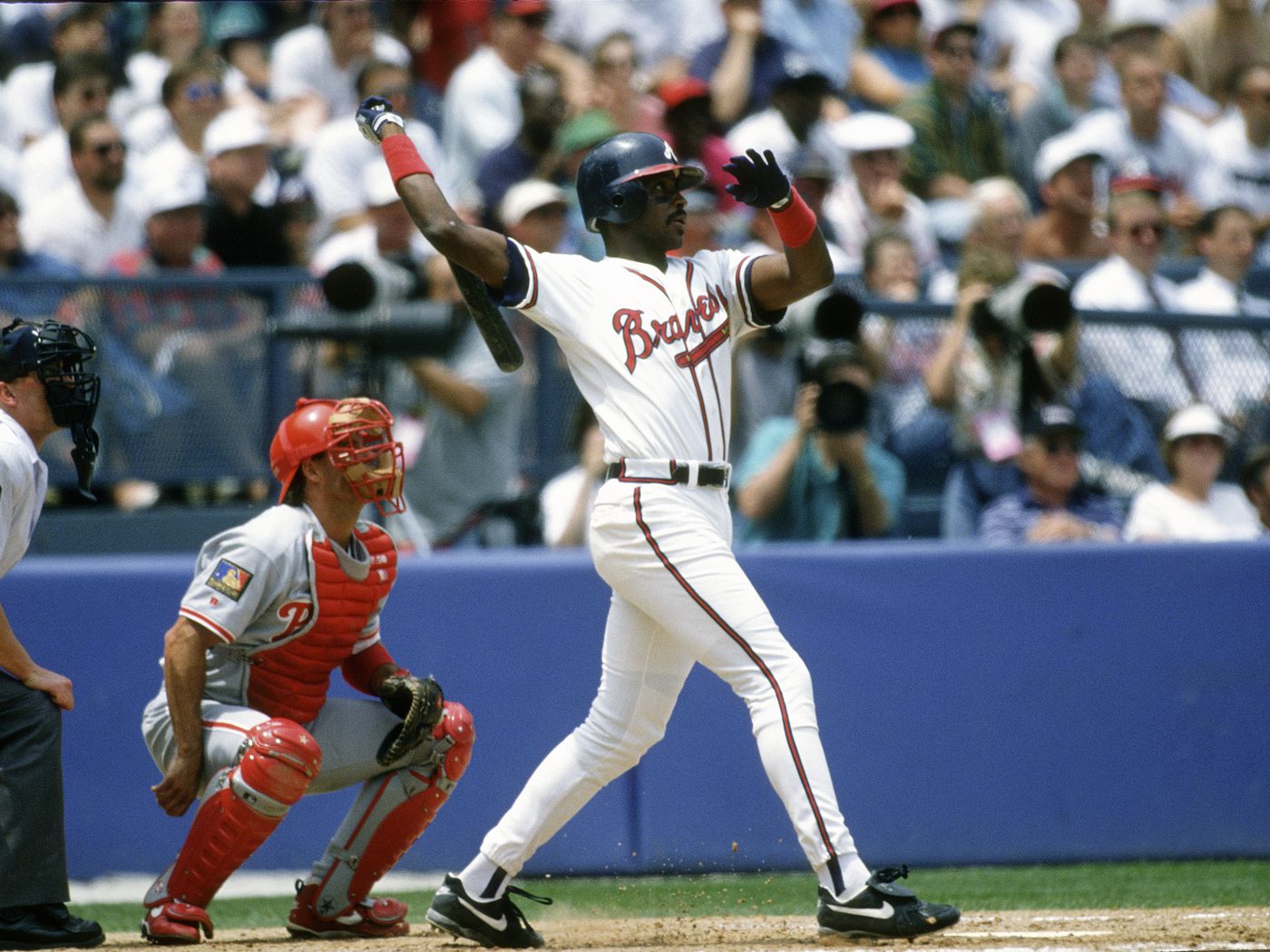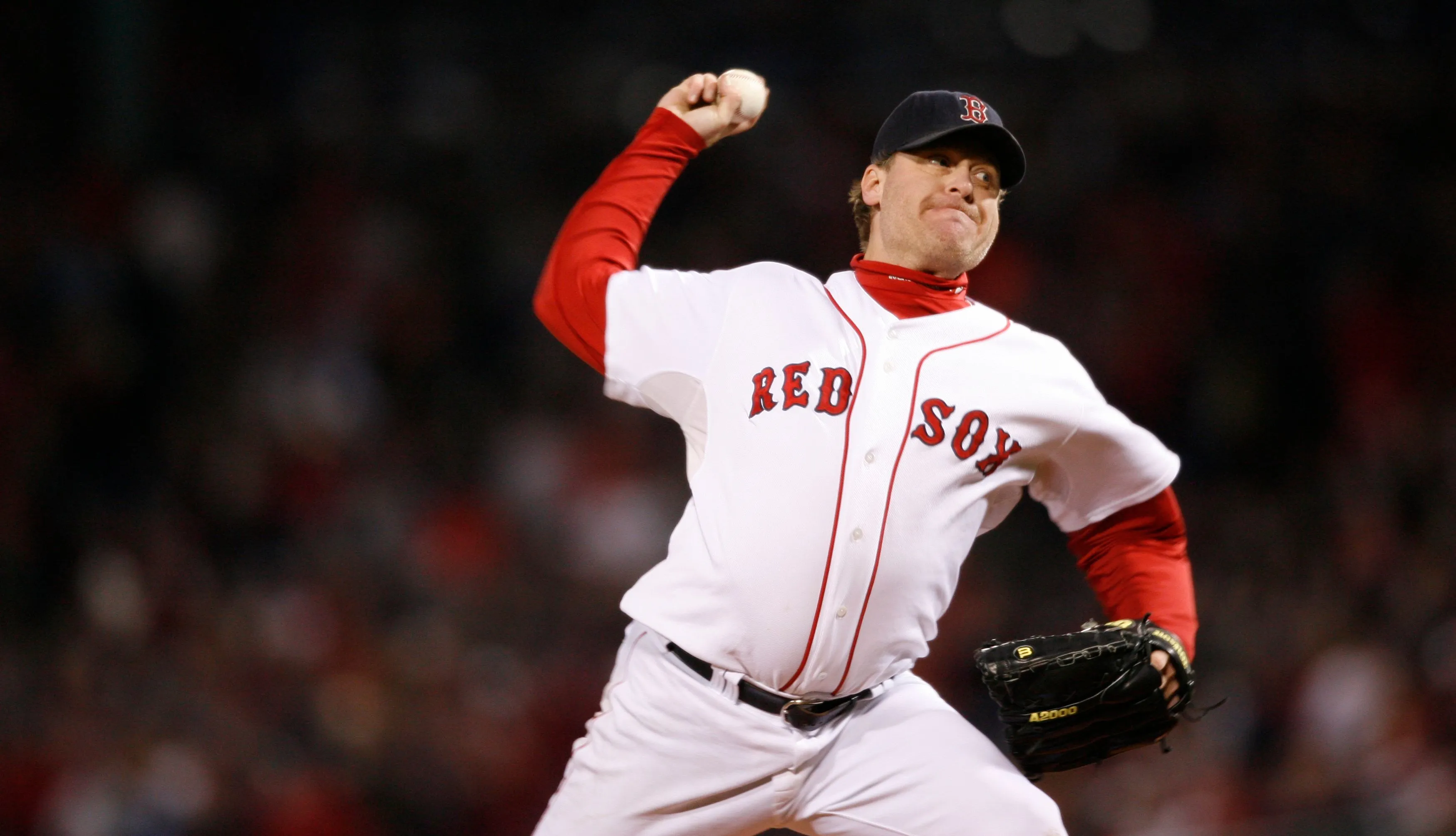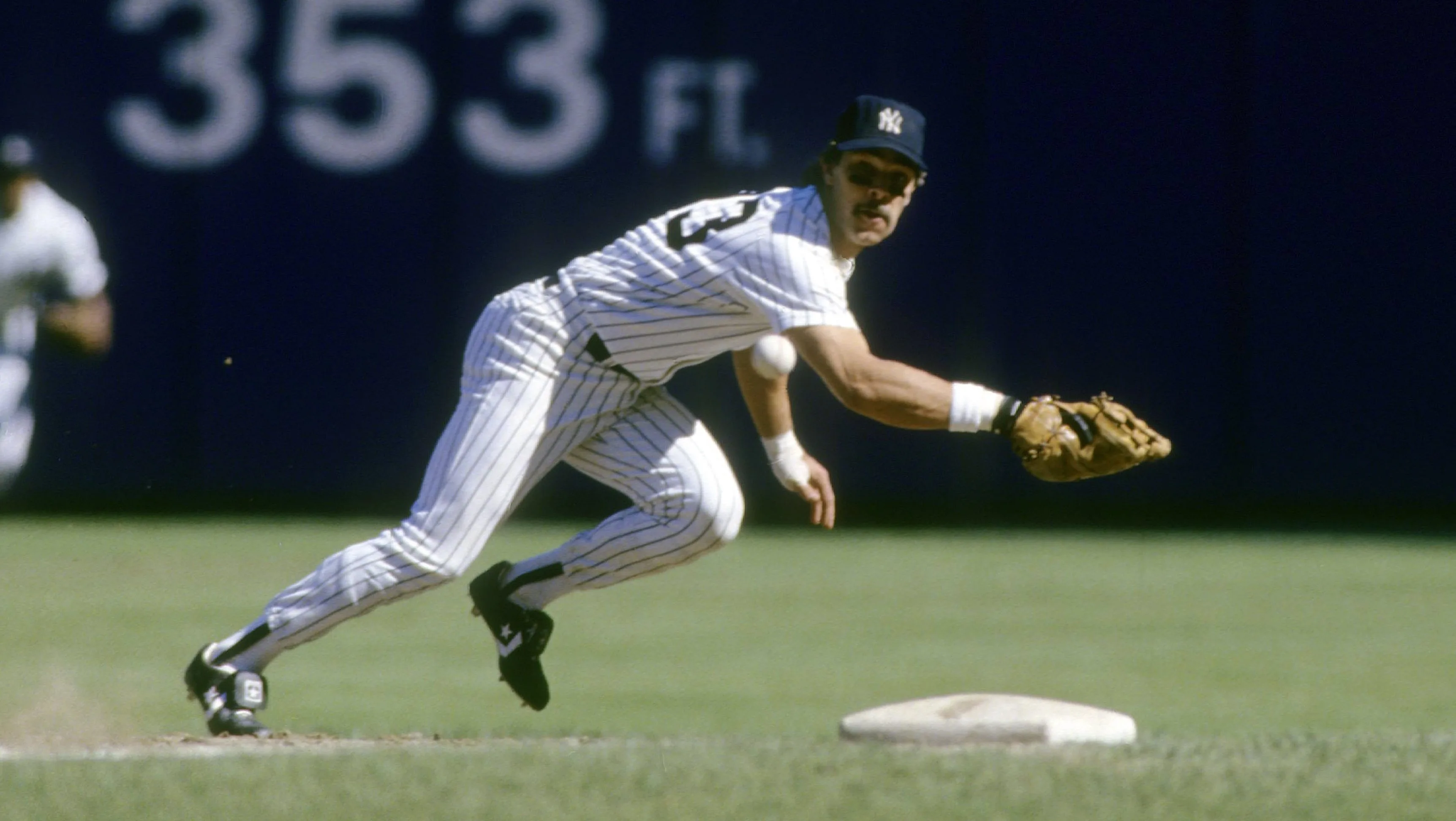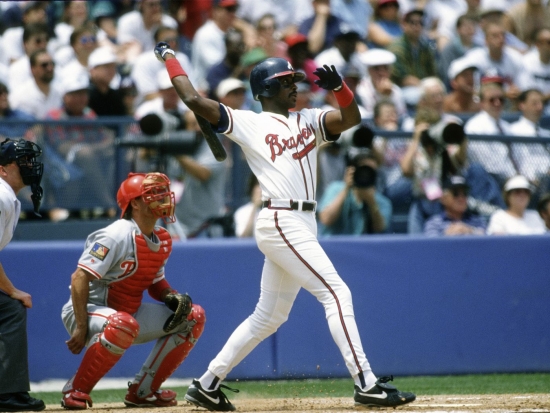
Cooperstown justice for the Crime Dog? Fred McGriff may very well be elected to the Hall of Fame this year--but has the Contemporary Baseball Era Committee gamed the ballot?
Why is the ballot gamed? Because the balance of the ballot comprises three PED (performance-enhancing drug) Penitents—Barry Bonds, Roger Clemens, and Rafael Palmeiro—and one Social Media Miscreant, Curt Schilling.
One clear theme that has emerged in the last decade of spirited and often contentious voting, mostly by the Baseball Writers' Association of America (BBWAA) but also in some measure by the Veterans Committee, is that three criteria listed in Rule Five: Voting of the BBWAA Rules of Election process—"integrity, sportsmanship, and character"—have become paramount factors in determining who gets into the increasingly Disneyfied version of Major League Baseball glorified by the Baseball Hall of Fame.
There are certainly sufficient metrics to evaluate the other three Rule Five criteria—"the player's record, playing ability . . . and contribution to the team(s) on which the player played"—because the sabermetric revolution has now sharpened that to almost an exact science. On those criteria alone, all eight player candidates deserve to be on this ballot.
But with the PED furor that was percolating when Palmeiro debuted on a BBWAA ballot in 2011 (with Mark McGwire in his fifth ballot year already) and then erupting when Bonds and Clemens debuted two years later—with the BBWAA throwing a shutout, electing no one, in 2013—PED in particular, and player conduct in general, became lightning-rod issues for voters.
Player behavior such as PED does have a direct impact on the player's on-field performance and is a legitimate concern. However, what has become downright disturbing is the increasing focus on player behavior that occurs off the field and—more ominously—after the player's playing career has ended.
Hall of Fame? Or Hall of Saints?
Schilling did not become a Social Media Miscreant until after his playing career ended in 2007. (Facebook and Twitter had just come online in 2004 and 2006, respectively.) But as Schilling's tenure on the BBWAA ballot was winding down with, at least after 2020, a certainty of election to the Hall in his remaining two years, opposition to his sometimes-scabrous opinions grew, with Schilling's own churlish ripostes following his near-static 2021 ballot performance all but dooming his final year on the ballot.
Also taking a BBWAA ballot hit in 2022 was Omar Vizquel. Domestic abuse alleged by his ex-wife was already being investigated by Major League Baseball when it was reported in August 2021 that he was named in a civil action for alleged sexual harassment of an autistic bat boy in 2019; these are the most likely culprits for his precipitous plunge in votes—losing more than half of his support from 2021—as he now enters the "decline phase" of his BBWAA eligibility. (This year will be his sixth year on a ballot with a maximum tenure of ten years.)
Without minimizing the damaging effects of hate speech and, more seriously, sexual harassment and physical or psychological abuse of one's significant others, which has become a major problem in baseball, this does raise a fundamental question: Are Hall of Fame voters, either the BBWAA or the Veterans Committee, trying to legislate morality in an attempt to make the Hall of Fame into the Hall of Saints?
Election to the Baseball Hall of Fame is, in effect, a canonization; we speak of "enshrinement" in the Hall as that player, much more so than non-player inductees, becomes revered for all time as an exemplar—if not quite a paragon—of the best that baseball can offer: not just one of its great players but also a great human being.
That is what the late Hall of Famer Joe Morgan seemed to be promoting in his now-infamous 2017 letter to Hall of Fame voters urging them not to vote for candidates with known or suspected PED associations. Especially touching is his postscript describing a trip to Cooperstown as "an uplifting, feel-good visit" for families. That is a nice sentiment; however. the only problem is that in order to accomplish that, you have to efface a lot of unpleasant, even ugly baseball history to keep that visit "uplifting" and "feel-good." That is not only a distortion of history, it is dishonest.
Baseball began with rough-and-tumble roots in the 19th century. Prominent bad behavior included cheating, such as scuffing, doctoring, and defacing the one ball used throughout a game, which led to the death of batter Ray Chapman in 1920, hit in the head by a Carl Mays pitch, a tragedy that prompted the immediate replacement of dirty balls and outlawed the spitball, thus ushering in the live-ball era; gambling, which culminated in the "Black Sox" World Series scandal of the previous year while Pete Rose's permanent banning from baseball is a continuing reminder of how seriously Major League Baseball still takes gambling; and, until 1947, the overarching societal reality of racial discrimination that prevented African-American players from participating in MLB—with efforts as recently as 2020 to whitewash that history by claiming that "the Negro Leagues are the Major Leagues."
As the Houston Astros celebrate their 2022 World Series victory, they still must live with the cheating scandal that tarnished their 2017 World Series victory. One of baseball's greatest young talents, Fernando Tatis, Jr., tested positive for PED in 2022 and served an 80-game suspension. Whether these events will come back to haunt the individuals involved who might face future consideration for the Hall of Fame remains to be seen—and sooner rather than later as Carlos Beltran, reputed to have been the enforcer for the Astros' 2017 cheating scandal, is all but guaranteed to appear on his first BBWAA ballot this year.
Induction into the Baseball Hall of Fame is indeed a privilege, not a right. But what does it say about the sport when its greatest players are not in the Hall of Fame? Its all-time hit king, Rose. Its all-time home run king, Bonds. One of its winningest pitchers and strikeout leaders, Clemens. One of its greatest postseason pitchers, Schilling. Haven't kids experiencing that "uplifting, feel-good" visit already started to ask those questions? When do you, proverbially speaking, stop telling them the stork brought the new baby and start telling them the facts of life?
And when and where do you stop? In 2021, Roberto Alomar, inducted into the Baseball Hall of Fame in 2011—his second attempt, as his first-ballot snub seemed to be "punishment" for his notorious 1997 spitting incident involving umpire John Hirschbeck—was banned from baseball because of allegations of sexual harassment in 2014 lodged by a Toronto Blue Jays staffer. The Blue Jays fired him and removed his Hall of Fame banner from the Rogers Centre, their home field, although the Baseball Hall of Fame has not yet taken any action regarding his "enshrinement."
But will it? Should it? Is the Hall simply leaving it up to BBWAA voters to play the heavy and do the enforcement of "integrity, sportsmanship, and character" before players are inducted and prove to be human after all with potential for disgraceful behavior like the rest of us?
Is this bad behavior a recent phenomenon? Of course it isn't. That hasn't changed. What has changed are attitudes toward societal violations that are much less permissive, tolerant, or acquiescent than in the past—and that means that there are very likely player inductees in the Hall whose behavior was just as disgraceful in their day as it is today, but they did not face the same scrutiny and opprobrium as today's recent and potential inductees.
It does leave troubling questions, though, doesn't it? Do any of those idols have feet of clay, a serial wife beater, or a sexual abuser of his own children? If so, how many? Former Big-League pitcher Jim Bouton's landmark 1970 book Ball Four, tame as it appears now compared to a half-century ago, incited furious gnashing of teeth within the industry for its exposé of behavior that sullied that manicured image of the ballplayer as "role model." Is the Baseball Hall of Fame trying to regain that now-lost past glory?
There is no way the Contemporary Baseball Era Committee will cast enough votes to elect Bonds, Clemens, Palmeiro, or Schilling to the Hall of Fame. In fact, the Selection Committee may have chosen them precisely to give McGriff and the other three a better chance to be elected. But let's take a closer look at this new committee.
Debut of Contemporary Baseball Era Committee
In April 2022, the Baseball Hall of Fame, seemingly striving for simplicity, revamped its Veterans Committee structure from its 2016 reconfiguration. Now the emphasis is on Contemporary Baseball, meaning baseball from 1980 to the present, with breakouts between players, evaluated this year for 2023 induction, and non-players, to be evaluated next year for 2024 induction. All baseball prior to 1980 now falls to the Classic Baseball Era Committee, which will stretch back to 1871 when it convenes in 2024 for potential 2025 inductions.
Ballots will be limited to eight candidates for all three committees, although the 16-member committee structure remains from previous iterations. Members may vote for up to three candidates and may also choose to vote for none. The induction threshold remains at 75 percent, or at least 12 of the 16 members voting for the same candidate.
Committee composition comprises current Hall of Famers, both players and non-players, executives, and veteran media members; the rules posted on the Hall of Fame's site do not specify that historians (such as John Thorn) are included, although they have been in the past.
The committees might have been revamped, but it's unlikely that the approach of the members will change. Historically, Veterans Committee voters haves been, paradoxically, both more accommodating and more restrictive than BBWAA voters.
Many, though not all, of the more marginal, if not simply suspect, Hall of Famers have been voted in by the committee; Harold Baines's 2019 induction raised eyebrows as Baines, who, starting in 2007, barely managed to stay on the BBWAA ballot until he dropped off in 2011; appearing on his first post-BBWAA ballot in 2017, Baines received fewer than five votes before returning two years later to pass over the threshold.
Moreover, the Veterans Committee has, in recent years, looked favorably upon players who exited the BBWAA ballot without induction, particularly if they lasted the entire length of the maximum allowable time on the ballot: 15 years prior to 2015, then 10 years subsequently, with a few players, such as Don Mattingly, grandfathered in if they had already passed that 10-year mark when the rule change took effect.
Thus, on the 2018 Modern Baseball Committee ballot, both Jack Morris, who spent 15 years on the BBWAA ballot before exiting in 2014, and Alan Trammell, another 15-year veteran of the BBWAA ballot who exited in 2016, were both inducted into the Hall on their first appearance on a post-BBWAA ballot. Similarly, Lee Smith, after 15 years on the BBWAA ballot before his departure in 2017, was elected to the Hall in 2019 in his first opportunity with the Today's Game Committee.
It may be a very small sample size but it could prove fruitful for Fred McGriff, who, making his BBWAA debut in 2010 and thus ineligible for grandfathering, spent 10 years on the BBWAA ballot before bowing out in 2019. A classic threshold candidate, McGriff seems the most likely of the current post-BBWAA candidates to be lifted over the Cooperstown threshold by the 16 members voting this year, based on recent history.
Also possible are Don Mattingly and Dale Murphy, both of whom have appeared on Veterans Committee ballots in 2018 and 2020; both are also 15-year veterans of the BBWAA ballot, with Murphy exiting in 2013 and Mattingly in 2015. Albert Belle has the least chance of the "clean" candidates as he barely survived his debut on the BBWAA ballot in 2006 and fell off the next year; Belle has appeared on two post-BBWAA ballots in 2017 and 2019.
As for the four current "tainted" candidates, the only recent relevant data point is that of Mark McGwire, done on the BBWAA ballot by 2016 and listed on the Today's Game Era ballot the following year, where he received nominal support and has not returned to a Veterans Committee ballot since.
This trend suggests that "clean" recent players, particularly those who toiled long and hard on the BBWAA ballot, are more likely to receive a Hall pass to Cooperstown from Veterans Committee voters favorably inclined toward them while the opposite is true of "tainted" recent players, whose notoriety tends to make voters disinclined toward them. Granted, these are tiny sample sizes, but it does suggest a reasonable pattern buttressed by Joe Morgan's emphatic 2017 missive to BBWAA voters regarding PED-associated candidates.
In other words, Barry Bonds, Roger Clemens, and Rafael Palmeiro are in a situation akin to a kangaroo trial whose verdict is a foregone conclusion: they are not going to find support among their hoped-for Hall of Fame peers. That increases the odds for McGriff and perhaps the other three "clean" candidates, and thus the gaming alluded to at the top of this article.
That "gaming" might not be conscious, let alone deliberate, and it may indeed be an attempt to be fair-minded, but given how prolonged and contentious has been the discussion regarding PED in the last two decades, any candidate with that taint would not be betting the mortgage on election to the Hall.
And what about Curt Schilling? Here the Veterans Committee finds itself in a novel situation, at least in recent memory, anyway, because it now has to face evaluating a candidate whose notoriety lies not just outside the playing field but also outside his career as a player.
Will the Contemporary Baseball Era Committee stick its neck out to oblige Curt Schilling, whose playing career belongs in the Hall of Fame even if his abrasive social-media presence doesn't?
Contrary to Schilling's churlish request to be removed from the BBWAA ballot following the 2021 vote, which included the comment "I'll defer to the veterans committee and men whose opinions actually matter and who are in a position to actually judge a player," it's unlikely that the committee will stick its neck out and produce the 75 percent needed for his induction.
But let's hope Schilling does return on a subsequent Contemporary Baseball Era Committee ballot. Factor out the PED Penitents, and this Social Media Miscreant is the best player on this ballot. I've held that view for more than a decade, and although my social and political views could not be further from Schilling's, he is a Hall of Fame pitcher whose induction is long overdue.
For sake of contrast, here are BBWAA voting statistics for the eight candidates.
|
2023 Contemporary Baseball Era Player Candidates, BBWAA Voting Summary |
||||||
|
Player |
First Appearance |
Last Appearance |
Years on Ballot |
Debut Pct. |
Ending Pct. |
Highest Pct. |
|
Belle, Albert |
2006 |
2007 |
2 |
7.7 |
3.5 |
7.7 |
|
Bonds, Barry |
2013 |
2022 |
10 |
36.2 |
66.0 |
66.0 |
|
Clemens, Roger |
2013 |
2022 |
10 |
37.6 |
65.2 |
65.2 |
|
Mattingly, Don |
2001 |
2015 |
15 |
28.2 |
9.1 |
28.2 |
|
McGriff, Fred |
2010 |
2019 |
10 |
21.5 |
39.8 |
39.8 |
|
Murphy, Dale |
1999 |
2013 |
15 |
19.3 |
18.6 |
23.2 |
|
Palmeiro, Rafael |
2011 |
2012 |
4 |
11.0 |
4.4 |
12.6 |
|
Schilling, Curt |
2013 |
2022 |
10 |
38.8 |
58.6 |
71.1 |
That summary looks like a deathtrap, doesn't it? The most inviting candidates based on results—Bonds, Clemens, Schilling—are actually poison pills, the first two with PED and the third, Schilling, with toxic attitude. But of the four "safe" candidates, McGriff had the best showing, which is also notable because much of his decade-long tenure on the BBWAA ballot was in the teeth of the ballot logjam that plagued the 2010s.
Evaluating the Candidates
This section is short because—look, all eight of these players have been profiled extensively for years and there should be no surprises about their viability, or lack thereof, for the Hall of Fame.
Once again, though, performance-enhancing drugs (PED) are back on the ballot, this time with the largest emphasis the Veterans Committee has faced so far, and it will be instructive to see how the committee votes.
Do you want to stop the use of PED in Major League Baseball? It's very simple: One strike and you're out—a permanent ban from baseball for the first drug-test failure. One appeal, because false positives can occur along with other accidents and discrepancies, but that's it.
Will it arrest the PED usage that is still occurring? Probably. Will it actually be implemented? Not a chance. The blow to the talent pool would be fatal to the industry's revenue stream. Cheating in baseball is as old as the sport itself, and as long as human beings still play it, count on ways to push the envelope to get an edge to continue. Moreover, teams will continue to employ players after they've served their suspensions, and they'll leave the thorny questions of legacy and integrity to, well, the Hall of Fame.
Albert Belle: Still the only member of the 50-50 Club when he slugged 52 doubles and 50 home runs in 1995, and even bWAR says Albert Belle (7.0 bWAR) got rooked by Mo Vaughn (4.3 bWAR) for American League Most Valuable Player that year. Had a tremendous decade-long run just ahead of the steroids boom before his hip blew out, although how much more he could have added otherwise is debatable. Ranks 41st by JAWS (Jaffe WAR Score system, a function of bWAR) among left fielders and isn't a likely Hall of Famer, but his overall bWAR is comparable to Harold Baines's, so who knows?
Barry Bonds: Do we really need to say anything more about Barry Bonds? Is there anything new that can be said? In a performance-only Hall of Fame, Bonds would have been in on his first ballot, perhaps not unanimously because he made enemies among the voters, but with little effort. But that's not the Hall of Fame we have.
Roger Clemens: Ditto.
Don Mattingly: Although a completely different player than Belle, injuries also hampered Don Mattingly near the end of his career as a Gold Glove first baseman with decent power, a .307 career batting average, and an MVP Award in 1985. He stayed on the BBWAA ballot for 15 years and could find himself elected by the Veterans Committee although this is already his third appearance on its ballot, and the first two were not auspicious.
Cleanly fielding his induction to the Hall of Fame? Gold Glover Don Mattingly is back on his third Veterans Committee ballot--but will the third time be the charm on a ballot favoring "clean" players?
Fred McGriff: The biggest knock against Fred McGriff during his tenure on the BBWAA ballot was that his steady numbers weren't as gaudy as the PED players. Now he squares off against them again on his first post-BBWAA ballot, but this time the situation is completely different—and given the propensity of the Veterans Committee to reward "clean" players, particularly those who toiled until the end of their BBWAA run, the odds are definitely in his favor.
In my past BBWAA ballot evaluations, I never picked Crime Dog for my hypothetical ballot, but if he is elected this year, I have no issue with that. I'd only point out that the Hall of Fame is hardly hurting for slugging first basemen, although his career bWAR is still better than Harold Baines's. All right, Baines is in; let it go. That's baseball.
Dale Murphy: An odd bit of blowback, perhaps: Remember when Dale Murphy was nearing the end of his BBWAA run, and one of his sons began a support campaign that touted his positive integrity and sportsmanship since those criteria were being used negatively against the cheaters? If Joe Morgan were still alive, it might still play today.
A two-time MVP winner in the early 1980s, Murphy had a strong, though not world-beating, eight-year peak from 1980 to 1987, with 1986, his age-30 year, his only bum year during that stretch that yielded 42.4 bWAR, an All-Star-worthy average of 5.3 bWAR per year, and that accounts for most of his career bWAR of 46.5. His JAWS rank among center fielders is 27th, ahead of marginal Hall of Famers Earle Combs, Edd Roush, and Hack Wilson, but he's still looking up at an impressive crop, some in the Hall, some still out, ahead of him.
Rafael Palmeiro: When Rafael Palmeiro became the fourth batter to reach both 3000 hits and 500 home runs, he joined Hank Aaron, Willie Mays, and Eddie Murray, all of whom were inducted on their first ballot. Not so for Palmeiro, who was more a compiler like Steady Eddie than inner-circle legends Aaron and Mays.
On this ballot, Palmeiro is the least likely to be elected because of how he shot himself in the foot regarding PED: While testifying—under oath—to the US House of Representatives Committee on Government Reform in March 2005, he emphatically denied ever using PED. Then, in August later that year, he received a ten-day suspension for a positive test for the anabolic steroid stanozolol. Oops.
Curt Schilling: For a brief moment in the late 2010s, Curt Schilling seemed to be running neck-and-neck with Mike Mussina, and it seemed only a matter of time before both were elected to the Hall. That happened to Moose in 2019, a bit of slight as his BBWAA ballot debut was in 2014, one year after Schilling's, but it's the latter who is still waiting for the call.
And will continue to wait, because the Veterans Committee now has to figure out what to do about candidates who aren't good citizens in society. After their playing days are over. And how long does the good-behavior period last anyway? Maybe Robbie Alomar should be looking over his shoulder after all.
This is not to make light of the issue. Well, maybe in a schadenfreude kind of way, but that's internet protocol in any case. And you know the Contemporary Baseball Era Committee is going to punt on this one (excuse the mixed sports metaphor), at least this year, anyway.
Voting Projection for 2023 Contemporary Baseball Era Candidates
Predictions are foolhardy, but that's never stopped me. So, here goes:
|
Player |
Votes |
|
McGriff, Fred |
13 |
|
Mattingly, Don |
8 |
|
Bonds, Barry |
6 |
|
Clemens, Roger |
6 |
|
Schilling, Curt |
4 / <5 |
|
Murphy, Dale |
3 / <5 |
|
Belle, Albert |
2 / <5 |
|
Palmeiro, Rafael |
0 / <5 |
Admittedly, this is a robust voting projection that accounts for 42 of the maximum 48 votes, three per members of a 16-member committee, and those who fall below the 12-vote minimum needed for election may receive fewer votes than listed here. (For the bottom half of the tally, I've never seen specific vote counts beyond the first few candidates; thus, the "<5" notation.)
Barry Bonds and Roger Clemens are likely to garner the most non-election votes thanks to assertions that they were already Hall of Fame-caliber players before their PED taint, and Curt Schilling should also get some recognition as well, given that he was less than four percent away from election on the 2021 BBWAA ballot.
But it will be Fred McGriff who will walk away with the grand prize and will join whoever the BBWAA elects in January 2023, if anyone, in Cooperstown in July 2023. Or not. We will see on December 4.




Comments powered by CComment